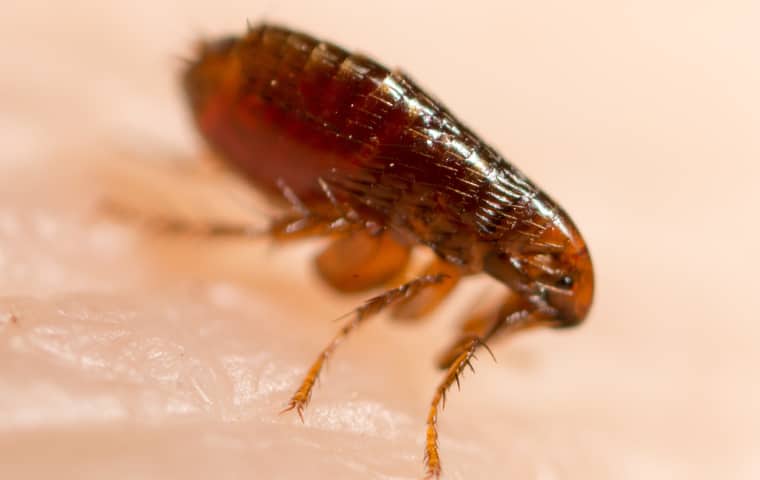
Flea Identification & Prevention
What You Need To Know About Fleas In Muskegon, MI
Fleas are the best jumpers in the animal world, able to jump 150 times their body length. If you discover a flea problem in your home or business, contact us for effective pest control in Muskegon, MI.
Frequently Asked Questions About Fleas
Have questions? We are here to help. Still have questions or can't find the answer you need? Give us a call at 231-300-9558 today!
-
What are fleas?One of the most common pest control problems are fleas. Fleas are tiny, parasitic, flightless insects that live off the blood of your pets, and other warm-blooded mammals and birds. They’re brown to black in color, and have flattened bodies that help them maneuver around their host’s fur. Even though they’re very small, you can see them with the naked eye. A fully grown flea is 1.5 – 3.2 millimeters in length. That’s roughly the size of a poppy seed or a large sesame seed. They are surrounded by a hard exoskeleton shell making them very resilient and tough to kill.

-
Where do fleas come from?
Fleas rarely jump from host to host. Instead, flea transmission is done through eggs. After their first blood meal, female fleas can lay up to 100 eggs in a day. These eggs are not attached and will often fall off the host. A flea egg can lay dormant for up to 100 days until the right conditions for hatching occur.
A majority of infestations originate from outside. Common carriers are dogs, cats, raccoons, opossums, and coyotes. While these carrier animals walk around they continuously drop eggs off their bodies. Fleas thrive in the same shady protected areas your pets like to cool off in. During the day these animals seek shelter from the elements and create what is known as flea hotspots. A cool place like under a deck or beneath bushes are great places to relax for wild animals and pets alike.
Another common source of fleas is from dormant eggs. Moving into a new home can cause a previously dormant flea population to re-emerge. You don’t even need to have pets. If the previous owner had fleas simply living inside will trigger the flea eggs to hatch causing a new infestation.
-
How long can fleas live in my house?
After her first blood meal, a female can lay up to 100 eggs a day! These eggs are not attached so they fall off the host and lay dormant until conditions are right for hatching. Larvae hatch from the eggs and feed off any available natural material like dead insects, pet hair, vegetable matter, etc. The larva can live up to 18 days before they die, or given adequate food, cocoon for up to 4 days while it metamorphosis into an adult. An average adult flea lives for 2 to 3 months, but given optimum conditions, an adult flea can live up to a year and a half!
When exterminating fleas it’s important to attack all stages of the flea life cycle. Even if you thoroughly clean and do everything right, you may find yourself fighting the same flea infestation a few months later. If you’ve done everything and you’re still having flea problems contact a professional for advice.
-
Can fleas live in my bed?If you have pets that sleep in your bed with you at night you can absolutely have fleas living in your bed. Strip your bed regularly and inspect your mattress and box spring for tears and holes that fleas may get into. I’ve seen an instance where a cat managed to get inside the box spring and lay inside causing a hidden hotspot the owners couldn’t find for months.
-
Can fleas survive a washing machine?Fleas are incredibly resilient and tough to kill. But even they can’t survive a washing machine with hot water, soap and borax. Top it off with a dryer cycle on the hottest setting and you can be assured that any fleas or eggs will be dead.

Happy Customers in Your Neighborhood
Proudly Serving West Michigan & the Surrounding Areas
Check out some of our recent reviews!
-
“Very good price compared to others. Jeff came sprayed where my bees were and they were all dead the next day. Excellent service!”- Shana Phelps
-
-
“Safeguard Pest Solutions of Muskegon MI is one of the best, customer friendly, fast response time businesses I have ever experienced. I called in the morning and Jeff was at my house that afternoon! He knew exactly how to handle my situation and immediatel”- Nan Johnson
-
“Always provides such good service! We’ve used for years and will continue to! Such good pest prevention!”- Emma Hichue
Safeguard Pest Solutions Blog
Want all the latest news or updates? Browse through our blog to read our most recent posts and featured articles.




